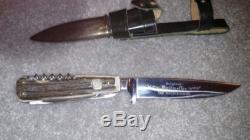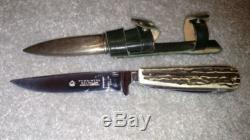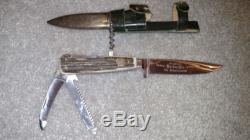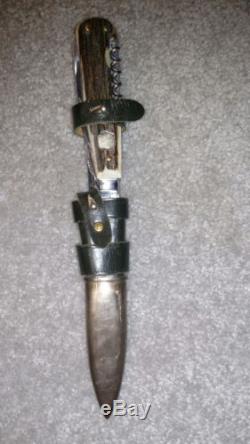Collectors Puma-Werk pre 1964 fixed blade hunting knife. Sheath included





PUMA, a well known name from Solingen, the home of high quality cutlery. Solingen, the traditional home of high quality knives, has been the scene of success for PUMA-WERK, Lauterjung & Sohn an internationally renowned byword for quality for more than two centuries.
It has always been part of the PUMA-WERK philosophy to manufacture products worthy of the magic name "Solingen". This attitude has produced impressive results: Hunting, sporting and pocket knives with the PUMA emblem are among the beat of their kind in the world, and are known and sought after all over the globe. By using the name PUMA, Lauterjung & Sohn are making a clear profession of their determination to uphold the standards maintained in Solingen, the centre of the German cutlery trade for centuries.PUMA-WERK, Lauterjung & Sohn, currently employing about 100 highly qualified staff members, has remained in family ownership since its foundation over 200 years ago. Johann Wilhelm Lauterjung had his first trade mark entered into the renowned Solingen Master Cutlers Guild register as long ago an 1769, before the French Revolution and the invention of the steam engine. Solingen's craftsmen had very early learned to harness the water power of the Wupper to drive their grinding stones. In the Lauterjung workshop the first famous knives were, at that time, ground on heavy natural stones.
At the beginning of the nineteenth century there were still 93 grinding cottages and six drop-hammer forging shops in operation, for cutlery products, along the Wupper and its seven tributary streams. The invention of the steam engine also led to structural changes within the cutlery industry. More and more firms moved into the centre of the then still small town of Solingen. At that time special care was taken to manufacture various items of cutlery of particularly high quality. The programme included razors, haircutting scissors, pocket knives, but also "cold arms", such as stilettos, hunting knives and sabres.
Valuable hand-painted catalogues still convey an impression of this very varied range of cutlery. They were the first members of the family to be "Just" businessmen. Under their influence, the sales emphasis turned increasingly to export, making considerable increases in production necessary. The two directors adopted various measures in order to cope effectively with this demand.A large building was erected, which still serves as the main factory building even today. From then on the PUMA-WERK in Solingen had two places of production. Both were equipped with efficient machines to provide the necessary assistance for those processes carried out by hand in order to cope with the increasing production of fine cutlery. Apart from that, the company abandoned the then still common practice of home labour in the cottages of the surrounding district and changed the whole production to craftsmen within their own factory. This move was a sensation at the time in Solingen.
The transition to a more progressive method of working immediately showed in an improvement in quality. It was now possible to control all stages of production directly within the factory. After the Second World War a fundamental change took place in the PUMA-WERK. With the entry of Oswald von Frankenberg und Ludwigsdorf into the company, the production programme was reorganized completely. As an experienced hunter, well acquainted with the special needs of hunting all over the world, Oswald von Frankenberg und Ludwigsdorf systematically switched over production to specialise in the manufacture of outdoor knives for hunting, fishing and sport.
Production of razors and haircutting scissors was reduced. On the basis of a carefully planned range of products, and by still continuing to employ traditional production methods, it soon proved possible for the PUMA-WERK, Lauterjung & Sohn company to make a breakthrough in the international market. Today the company occupies a leading position in the hunting, fishing, and sporting knives sector. Renate von Frankenberg took over the company as a general partner from her father Franz Lauterjung. This means that the PUMA-WERK is now in the sixth generation of family ownership, with the Lauterjung family also directly responsible for the company's running right from its inception. The company has also in the meantime expanded for the fifth time with a further new building. Production conditions have been so arranged that the highly skilled workers have modern and friendly working facilities at their disposal. However, PUMA still takes great care, to cultivate tradition: High quality cutlery goods are produced in the factory in exactly the same way as 200 years ago, with modern technology to assist the skills of craftsmanship. It is thus little wonder that the knives from the PUMA company are indisputedly considered as being among the leading products of their kind in the world, both with regard to their craftsmanship and finish, and also their usefulness.Whether this is with regard to the wide range of hunting knives, or knives for use on expeditions, for mountain climbing or for camping, or just special knives for sport fishing, sailing and diving, each individual knife is characterised by its superb quality. "Blades" that speak for themselves. Hunting knives from PUMA-WERK have long since become a hallmark for quality for the hunter and the forester as an indispensable requisite for daily use.
It has been shown that these knives have been developed an the basis of practical experience and that, apart from high quality, they also guarantee advantages with regard to their application techniques and their longevity. In view of their robust construction and their manifold fields of application, PUMA hunting knives are also extremely popular among nature lovers, gardeners, farmers, mountain climbers, etc. Even the "man in the street" appreciates these special knife models, not least on account of the high prestige attached to a knife with the PUMA emblem. There are essentially three types of knives which come into consideration for practical hunting purposes: The folding hunting knife, then the fixed-blade group of hunting knives, and finally the cold weapons and matchets. A well-tested model is, for instance, the "Original PUMA Waidblatt", developed in cooperation with Senior Forest Ranger Frevert.
The broad, heavy-duty blade with its weight well towards the point is the most important feature for a heavy hunting knife, which is also suitable for dressing and gutting of game. A particularly unusual knife construction is the 54 cm long PUMA matchet for the hunter.The blade is made of specially hardened silicon steel so that it is possible to use this knife for various purposes in the hunting reservation e. Preparing the paths for deer-stalking, building shelters, clearing the firing line of branches, cutting reed and sedge. From the manufacturing technique aspect, the folding hunting knives are produced in accordance with slightly different criteria from those applicable for normal knives. This starts for instance with the steel.
The blades are made of high quality steel, the practice even today is to grind, polish and mount the blades by hand. The blades, side scales and covers, and other component parts are held firmly together by hefty rivets. On folding knives, apart from the blade, the spring is also of considerable importance. Whereas in part stainless steel springs are used, in the case of hunting folders, in view of the considerable temperature variations encountered when hunting, only springs made of special spring steel are employed for high quality knives, they being more resistant to external influence, but they do require a degree of care on account of the danger of rust. The production of the spring is also a skill of its own in the handicraft of knife manufacture.The spring blank is entrusted to the cutler whose task it is to assemble all the individual parts of the folding knife. This experienced and versatile specialist punches, mills and hardens the spring, and then prepares it for later incorporation into the knife by grinding accompanied by the necessary fitting work.
A good hunting knife traditionally has scales made of staghorn. But scales can also be made of other materials, for instance, in case of the PUMA 4 Star series. This particularly handy hunting knife with & powerful, not too long, blade, was tried out by trappers and hunters in the Southern States of the USA, and is particularly useful when hunting small game. Depending on the model, staghorn, hardwood or ivory micarta was selected for the scales.
Solid nickel-silver or brass bolsters prevent the hand from slipping into the knife edge. In keeping with modern taste, these hunting knives are completely unadorned and without etching. The five part PUMA Universal knife developed in cooperation with Senior Forest Ranger Frevert, with his great wealth of practical experience in hunting, have proved their value in the past. The blade on this model is made of Stainless Super Keen Cutting Steel, which was specially produced and developed for PUMA products in accordance with their own analytic process. For safety reasons the main blade is lockable on these knives. The PUMA Universal hunting knife is particularly suitable for all hunting purposes, whether dealing with large or small game. Apart from the main blade there is a saw with a cartridge extractor and screwdriver, gutting blade, a bird drawing hook and a corkscrew available. Generally the Universal hunting knives have staghorn scales. There is a silver inlay to engrave the owner's name.The mountings on these knives are also in solid nickel silver. Especially popular, and not just among foresters and hunters, are the "collectors knives" from PUMA. Despite their high quality handmade finish, these are perfectly normal hunting knives.
As an example we would point to the exclusive "Wildlife" and "Red Deer" series, which represent particularly valuable knife creations. The "Red Deer" series, which has only recently been presented to the market, has a hand-worked design on the handle by Arno Hopp, a lecturer at Wuppertal University, who has made a name for himself with his highly regarded hunting scenery. The number of knives produced in this series has been limited to Just 300 by PUMA-WERK. Each individual knife has a number, which is also shown on the accompanying expertise. The "Wildlife" hunting knives are special models.Apart from "wild-boar-roebuck", "duck-pheasant" and "setter-two ducks", the series has now been extended to include the motif "chamoismarmot". Just like all the other knives in this series, this knife has a 7.5 cm long, lockable, stainless steel blade; the scales are made of ivory-micarta.
Unikates are handmade knives produced at the PUMA-WERK. The engravings and carvings are individually designed and carried out by famous artists. Each one in an original and, as the term unikate implies, there is only one in existence. All PUMA Unikates are supplied with a certificate of their uniquity The PUMA-WERK does also produce these knives to the customer's own design specifications and requirements. The PUMA GAME WARDEN series has made a name for itself as a series of functional and yet high standard knives for hunting and sporting fishing.These models fascinate with their classic old British blade form which was already popular a century ago among hunters and fishermen all over the world. However, PUMA-WERK has improved the blades: hollow ground, hand sharpened and grooved along the back of the blade for sure cutting control are the most striking features. There in a lock-blade that cannot close and injure while in use. The scales are also worth admiring. Waterproof Rio Jacaranda hardwood, fine grained, was mounted on to a solid brass casing.
At the end of the handle is a hole so that the knife can be secured on a leather strap or cord. There is an even more exclusive model to complement the GAME WARDEN: PUMA PRINCE, the basic model of the "Aristocrat" series has the same technical qualities as the GAME WARDEN, but has been made even more valuable by the real staghorn scales and the gold etching on the blade.
There are three other types of knives in the GAME WARDEN series, which have a second blade in addition. Cutting Steel Rockwell tested to approx. 57 Rc, and the press button is from stainless steel with PUMA-brass-inlay. The PUMA SPORT is a strong knife, compact and easily manageable, can be used for any purpose. Ou will not find another knife like this one as it is aged mint...The pictures provide a visual description. The item "Collectors Puma-Werk pre 1964 fixed blade hunting knife. Sheath included" is in sale since Sunday, April 16, 2017.
This item is in the category "Collectibles\Knives, Swords & Blades\Collectible Fixed Blade Knives\Vintage Fixed Blade Knives\Factory Manufactured". The seller is "theharmonicaking" and is located in Phoenix, Arizona. This item can be shipped to United States, Canada, Mexico, Norway, Colombia, Costa rica, Panama, Trinidad and tobago, Guatemala, Honduras.- Brand: Puma-Werk
- Type: Hunting
- Country/Region of Manufacture: Germany
- Authenticity: Original
- Color: Multi
- Blade Edge: Plain
- Blade Type: Clip Point
- Blade Length: 4.1 - 5in.
- Tang: Full
- Handle Material: Stag/Antler
- Dexterity: Ambidextrous
- Features: Sheath Included
- Year: pre 1964
- Blade Material: Carbon Steel

